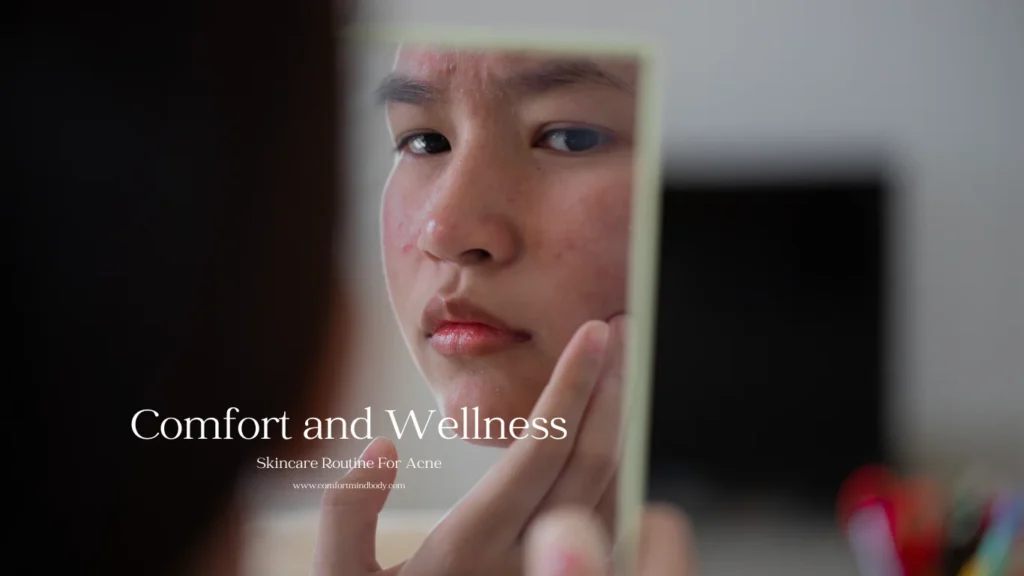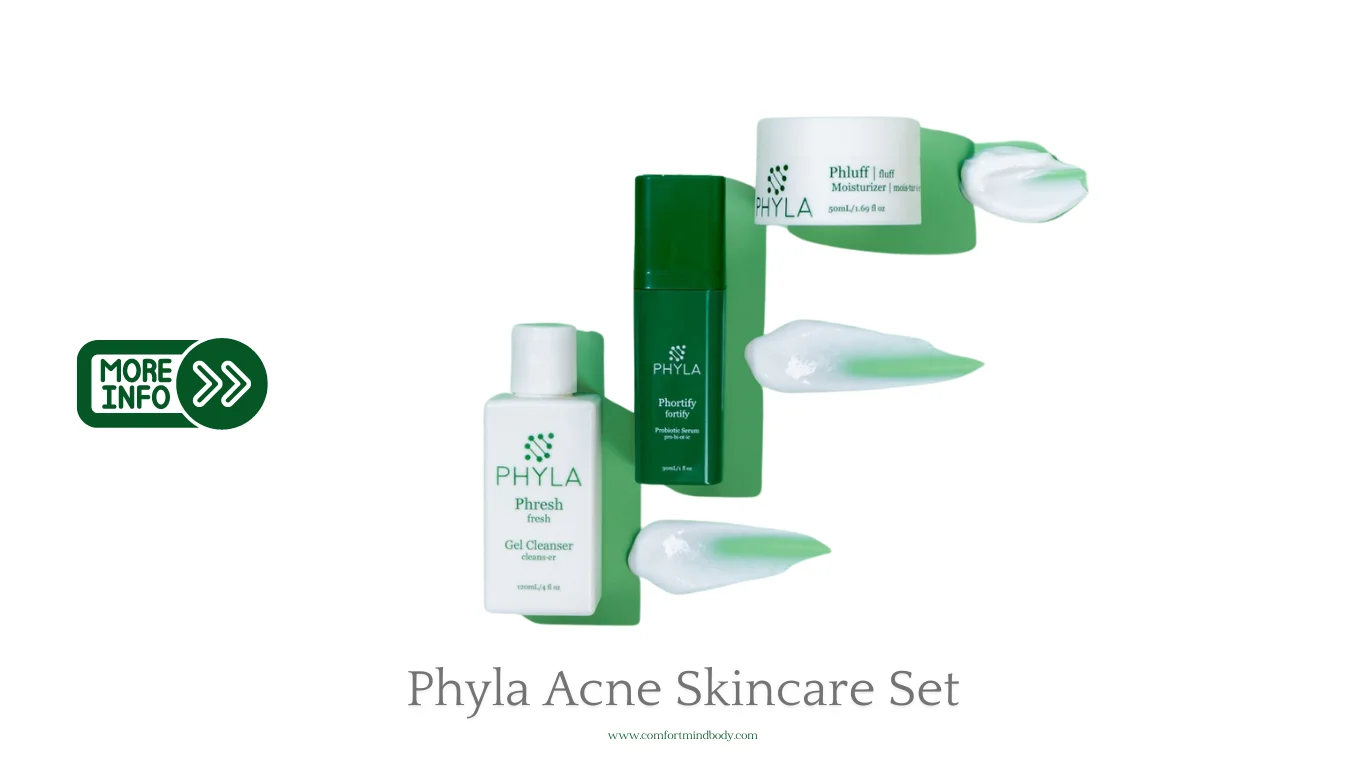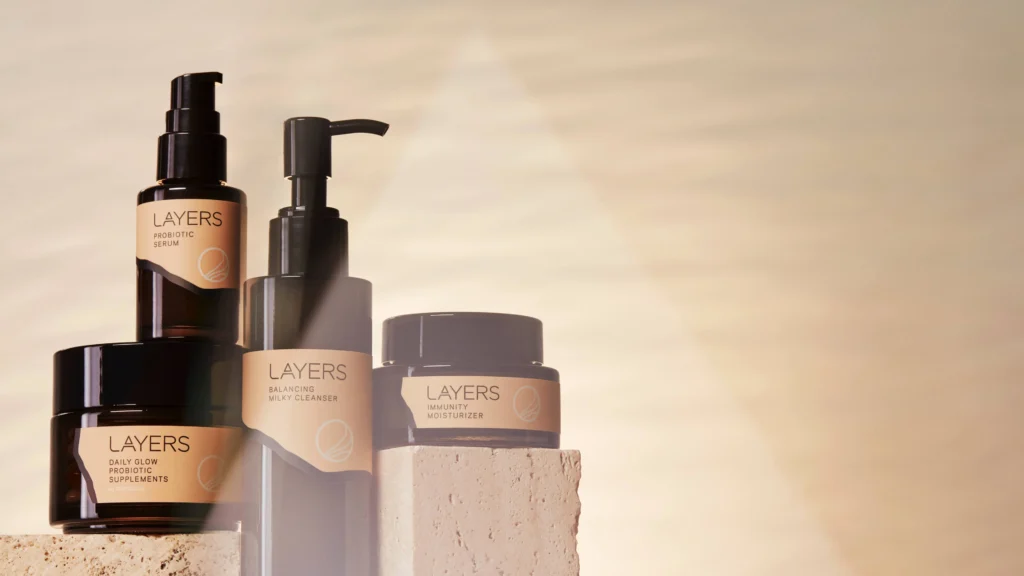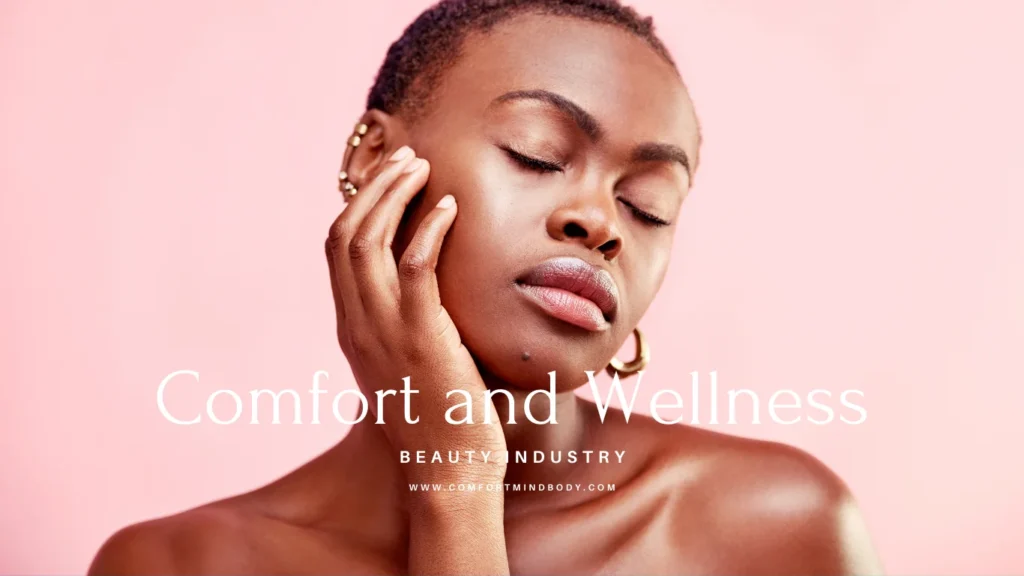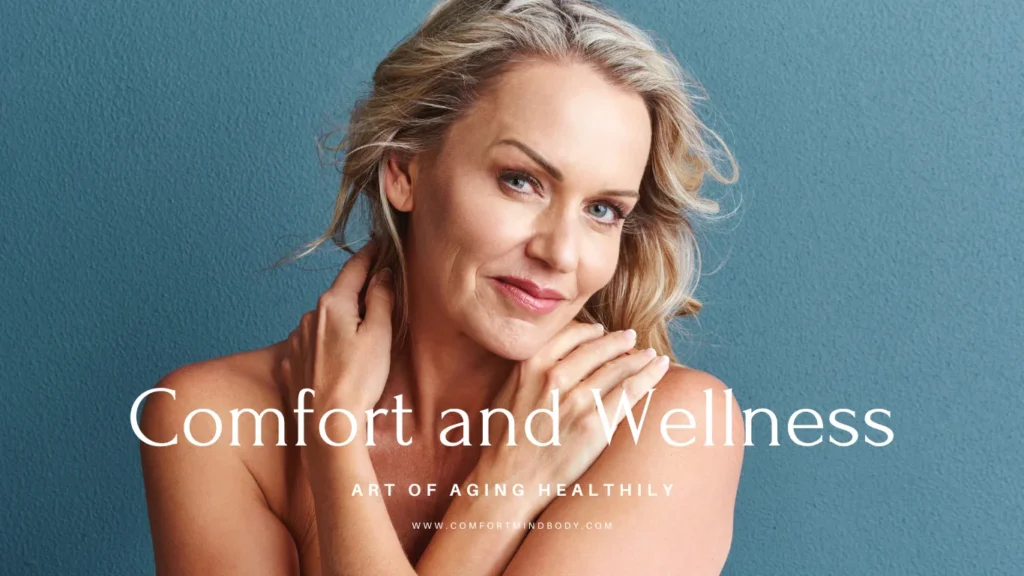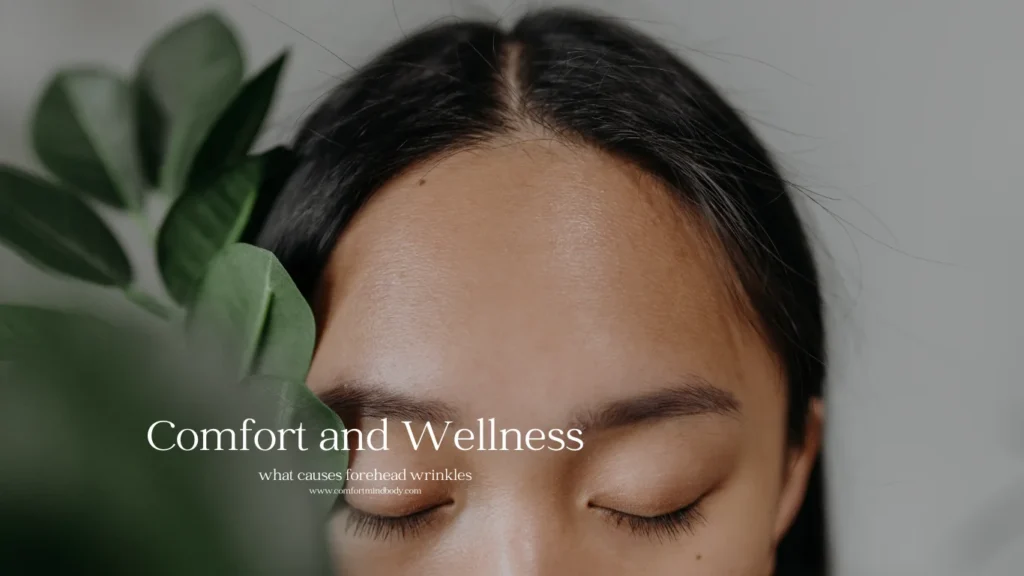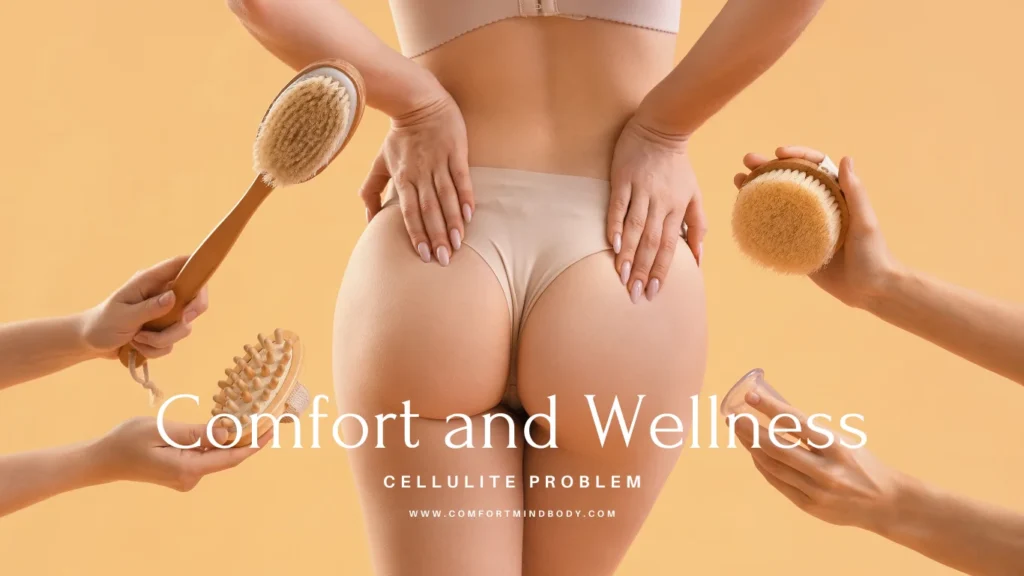Table of Contents
ToggleIntroduction:
Acne is a common skin condition that affects people of all ages. It can be a source of discomfort and insecurity, impacting both physical and mental well-being. The journey to clear skin can often feel overwhelming. With a myriad of products and advice available, it’s easy to feel lost.
This is where a structured skincare routine comes into play. A consistent, well-planned routine can be a game-changer in managing acne. But where do you start? What products should you use? How do you know if a routine is working?
These are valid questions that many people grapple with. This comprehensive guide aims to answer these questions and more. We delve into the science of acne, exploring its causes and types. We also discuss the impact of lifestyle on acne, shedding light on often overlooked factors.
The guide provides a step-by-step breakdown of an effective acne skincare routine. From gentle cleansing to sun protection, we cover all the essential steps. Plus, we also explore the world of Korean skincare. Known for its focus on gentle care and layering products, it offers valuable insights for acne management.
Skincare Routine For Acne: All Tips You'll Ever Need
Advanced acne care is another area we delve into. We discuss treatments like chemical peels and the role of non-comedogenic makeup. Lifestyle adjustments for a clear complexion are also covered. We examine the link between diet and acne, and the role of stress management and exercise.
Common myths and mistakes in acne care are debunked, providing clarity amidst the sea of misinformation. We also guide you in building a routine tailored to the unique needs of morning and night skincare.
Finally, we discuss how to monitor progress and when to seek professional help. This guide is designed to be a comprehensive resource for anyone seeking to improve their skin health and manage acne. Whether you’re a skincare enthusiast or new to skincare, you’ll find valuable insights and tips here.
Embark on this journey to clear skin with us. Let’s explore the world of acne skincare together.
Understanding Acne and Its Impact on Skin Health
Acne is more than just a skin condition. It’s a complex issue that can significantly impact a person’s life. Understanding acne is the first step towards managing it effectively. It’s crucial to know what acne is, what causes it, and how it affects the skin.
Acne is characterized by the appearance of pimples, blackheads, and whiteheads. It’s caused by the clogging of hair follicles with oil and dead skin cells. Inflammation plays a significant role in acne. It’s often the culprit behind the redness and swelling associated with pimples.
Acne can occur anywhere on the body. However, it’s most common on the face, chest, and back where oil glands are more abundant. The impact of acne goes beyond the physical. It can also affect a person’s mental and emotional health.
Understanding the link between lifestyle and acne is also important. Factors like diet, stress, and sleep can influence acne. Let’s explore the science of acne, how lifestyle affects it, and the psychological impact of this skin condition.
The Science of Acne: Causes and Types
Acne is primarily caused by four factors: excess oil production, clogged hair follicles, bacteria, and inflammation. Hormonal fluctuations can trigger excess oil production. This is why acne is common during puberty, menstruation, and pregnancy.
Clogged hair follicles result from the buildup of oil and dead skin cells. This creates a perfect environment for acne-causing bacteria to thrive.
Inflammation occurs when the body’s immune system responds to these bacteria. This leads to the redness and swelling associated with acne. There are different types of acne. These include blackheads, whiteheads, papules, pustules, nodules, and cysts.
Understanding the type of acne you have can guide your treatment choices. It can help you choose the right products and treatments for your skin.
How Lifestyle Affects Acne
Lifestyle plays a significant role in acne. Certain habits and behaviors can either help manage or exacerbate the condition. Diet is one such factor. Some studies suggest a link between acne and a diet high in refined sugars and dairy products.
Stress is another factor. It can trigger hormonal fluctuations that lead to increased oil production. Lack of sleep can also worsen acne. It can disrupt the skin’s natural repair process and exacerbate inflammation.
Physical activity is beneficial for skin health. It improves circulation and helps reduce stress, both of which can help manage acne.
It’s important to note that lifestyle changes alone may not clear acne. They should be part of a comprehensive acne management plan that includes a proper skincare routine.
The Psychological Effects of Acne
Acne can take a toll on mental health. It can lead to feelings of embarrassment, frustration, and low self-esteem. Studies have found a link between acne and mental health issues. These include depression, anxiety, and suicidal thoughts.
The psychological impact of acne should not be overlooked. It’s an important aspect of acne management. Seeking support, whether from a mental health professional or a support group, can be beneficial. It’s important to remember that you’re not alone in your acne journey.
Crafting Your Acne Skincare Routine
Creating an effective acne skincare routine is a process. It involves understanding your skin type, choosing the right products, and using them correctly. A good skincare routine for acne should address the main causes of acne. These include excess oil production, clogged pores, bacteria, and inflammation.
It’s important to remember that everyone’s skin is different. What works for one person may not work for another. Patience is key when it comes to acne skin care. It can take several weeks to see improvements.
Consistency is also crucial. Regular use of your skincare products will yield the best results. Let’s break down the steps of an effective acne skincare routine.
Step 1: Gentle Cleansing
Cleansing is the first step in any skincare routine. It removes dirt, oil, and makeup from the skin. For acne-prone skin, a gentle, non-comedogenic cleanser is recommended. This type of cleanser won’t clog your pores.
Avoid harsh soaps and cleansers. They can strip the skin of its natural oils, causing it to produce more oil to compensate. Double cleansing, a method popularized by Korean skincare, can be beneficial for acne-prone skin. It involves using an oil-based cleanser followed by a water-based cleanser.
The oil-based cleanser removes oil-based impurities like makeup and sebum. The water-based cleanser then removes water-based impurities like sweat and dirt. Remember to cleanse your skin twice a day, in the morning and at night. Over-cleansing can irritate the skin and worsen acne.
Step 3: Toning - Restoring pH Balance
Toning is the next step in your skincare routine. It helps restore the skin’s pH balance after cleansing. For acne-prone skin, look for a toner with acne-fighting ingredients. These may include salicylic acid, tea tree oil, or witch hazel.
Avoid toners with alcohol. They can dry out the skin and cause it to produce more oil. Apply toner with a cotton pad or your fingers. Be gentle to avoid irritating the skin.
Step 4: Targeted Treatments - Serums and Spot Treatments
Targeted treatments deliver powerful ingredients directly to your acne. They can help reduce inflammation, kill bacteria, and unclog pores Serums are lightweight, fast-absorbing liquids. They’re packed with active ingredients that can target specific skin concerns.
For acne-prone skin, look for serums with ingredients like salicylic acid, niacinamide, or retinol. Spot treatments are applied directly to pimples. They can help reduce inflammation and speed up healing. Remember to patch-test new products. This can help you avoid potential allergic reactions or irritation.
Step 5: Moisturizing - Hydration for Acne-Prone Skin
Moisturizing is an essential step in your skincare routine. It helps keep your skin hydrated and strengthens your skin barrier.
Even oily and acne-prone skin needs moisturizer. Without it, your skin can become dehydrated and produce more oil to compensate. Look for a lightweight, non-comedogenic moisturizer. This type of moisturizer won’t clog your pores. Avoid heavy, greasy products.
Korean Skincare Routine for Acne
Korean skincare has gained global recognition for its holistic and detailed approach. It emphasizes gentle care, hydration, and layering of products. For acne-prone skin, the Korean skincare routine can be a game-changer. It focuses on maintaining a healthy skin barrier, which is crucial for managing acne.
The routine involves multiple steps, each with a specific purpose. It may seem overwhelming at first, but each step is important. The Korean skincare routine can be customized to suit your skin’s needs. Not all steps need to be done every day.
It’s also important to introduce new products gradually. This allows your skin to adjust and minimizes the risk of irritation. Remember, consistency is key. Regular use of your skincare products will yield the best results.
The 10-Step Korean Skincare Philosophy
The 10-step Korean skincare routine is more than just a regimen. It’s a philosophy that views skincare as a form of self-care. The steps are as follows:
- Oil-based cleanse
- Water-based cleanse
- Exfoliate
- Toner
- Essence
- Treatments (serums, ampoules)
- Sheet mask
- Eye cream
- Moisturizer
- Sun protection
Each step serves a specific purpose in maintaining skin health. They work together to cleanse, treat, and hydrate the skin. The routine may seem extensive, but it’s not about the number of steps. It’s about giving your skin what it needs.
Remember, the Korean skincare philosophy is about consistency and patience. It’s a long-term commitment to skin health.
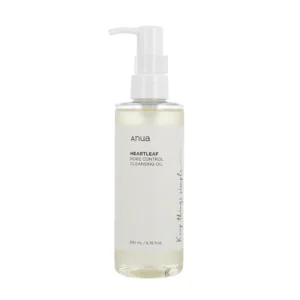
Anua. Heartleaf Pore Control Cleansing Oil
This cleansing oil removes makeup, dirt, and sebum without clogging pores. It dissolves blackheads and residues, ideal for double cleansing. Infused with Heartleaf extract, it soothes and hydrates skin.
Hypoallergenic and tested for irritation, it’s gentle on sensitive and acne-prone skin. The lightweight formula cleanses without stripping moisture.
![Skincare Routine For Acne: All Tips You'll Ever Need 5 [Anua] Heartleaf Succinic Moisture Cleansing Foam, Is Korean Skincare Better](https://comfortmindbody.com/wp-content/uploads/2024/08/Anua-Heartleaf-Succinic-Moisture-Cleansing-Foam-300x300.webp)
Anua. Heartleaf Succinic Moisture Cleansing Foam
A gentle cleanser for sensitive skin, providing daily moisture and exfoliation with rich foam. Leaves skin hydrated without tightness. Suitable for all skin types.
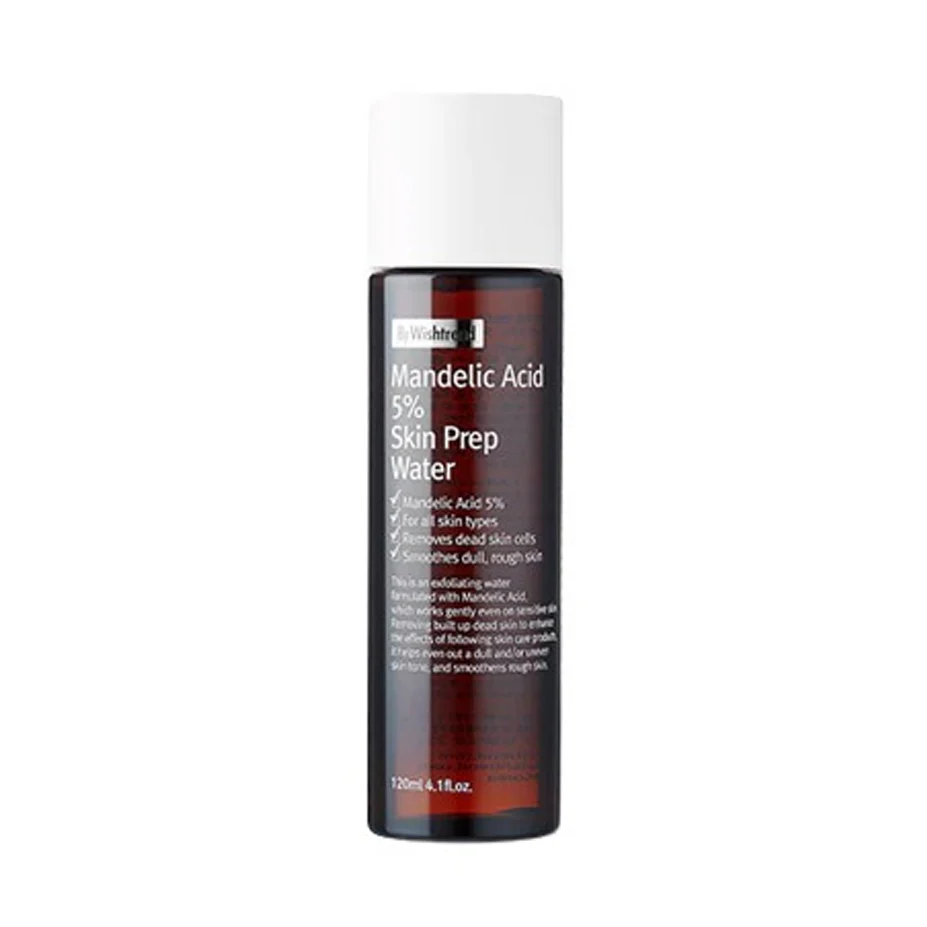
Wishtrend Mandelic Acid 5% Skin Prep Water
Gentle exfoliation is key to removing dead skin cells and achieving a smooth, radiant complexion. The Wishtrend Mandelic Acid 5% Skin Prep Water, with mandelic acid from almonds, gently exfoliates without irritation or dryness. Suitable for daily use, it refines skin texture, smooths rough patches, and boosts product absorption, leaving skin brighter and softer.
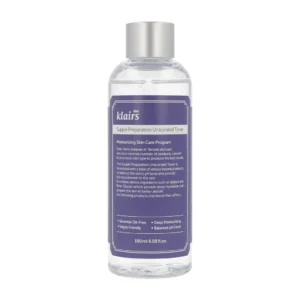
Klairs Supple Preparation Unscented Toner
Toning is essential for balancing moisture levels before applying serums or moisturizers. The Klairs Supple Preparation Unscented Toner offers hydration and soothing care without artificial fragrances. Its lightweight formula absorbs quickly, calming sensitive skin, reducing redness, and improving texture. This toner preps your skin to fully absorb the benefits of the next skincare steps.
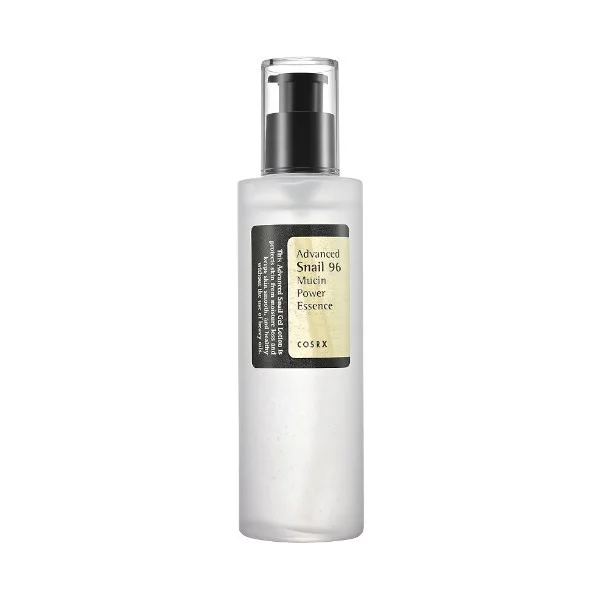
COSRX Advanced Snail 96 Mucin Power Essence
The I’m From Ginseng Serum is packed with ginseng extract, a renowned ingredient for its anti-aging properties. It helps to energize and revitalize the skin, improving elasticity and reducing the appearance of fine lines and wrinkles. The serum’s formulation supports overall skin vitality, giving you a youthful, radiant complexion.
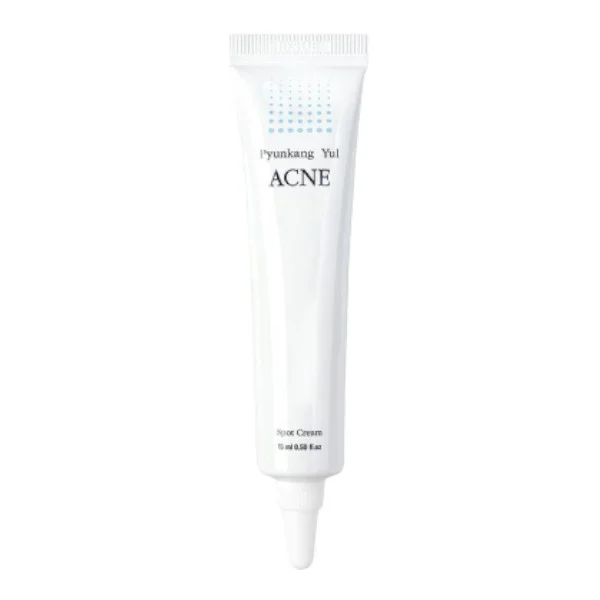
Acne Spot Cream
The acne line is Pyunkang Yul’s skincare line for those with skin issues. Forsythia fruit extract and white willow extract contained in the product rapidly alleviate ‘angry’ skin and adjust excessive skin sebum. Peptide ingredients strengthen the skin’s barrier and help manage healthy skin.
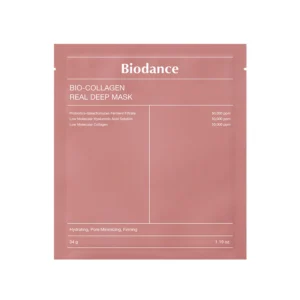
Biodance - Bio-Collagen Real Deep Mask
A hydrating mask with oligo-hyaluronic acid, collagen, and probiotics for pore tightening, elasticity, and a strengthened skin barrier. Safe for sensitive skin.
How to Use
Apply after skincare and leave for 3–4 hours or overnight.
Key Ingredients
Collagen, Hyaluronic Acid, Niacinamide, Probiotics.
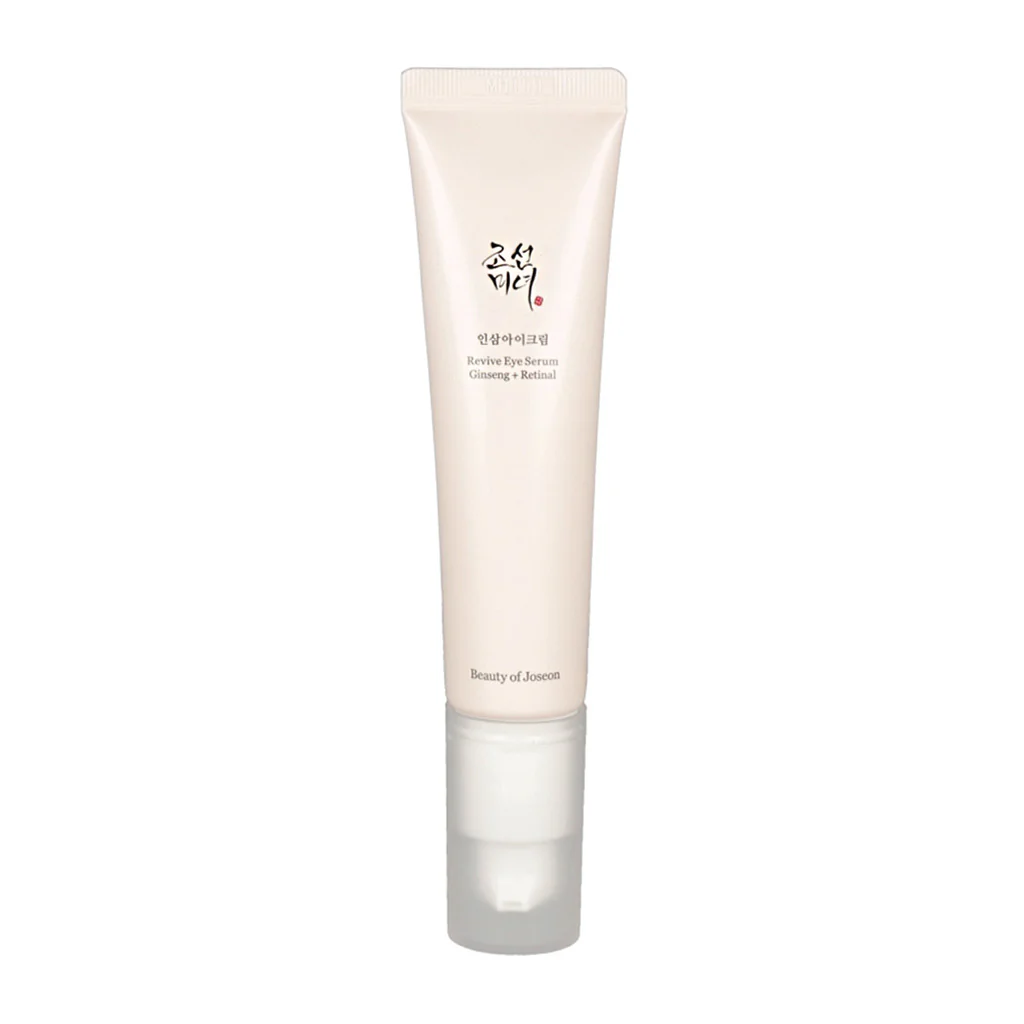
Beauty of Joseon Revive Eye Serum - Ginseng + Retinal
The serum boasts a non-sticky, nourishing texture that absorbs quickly, leaving a silky finish. Ideal for use around the eyes or on other areas of the face with wrinkles, it pairs well with eye creams and sunscreens for comprehensive care. Apply it after your toner for best results, and enjoy well-nourished, age-defying skin that remains hydrated and radiant throughout the day.
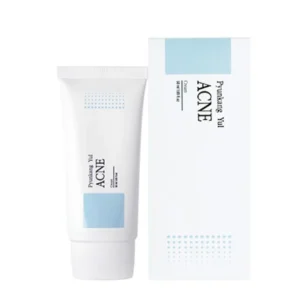
Pyunkang Yul - Acne Cream
For daytime hydration, the Belif The True Cream Moisturizing Bomb is a must-have. This intensely hydrating cream floods your skin with moisture, providing long-lasting relief to dry or dehydrated skin without feeling heavy. Together, these products ensure your skin stays soft, supple, and visibly radiant, day and night.
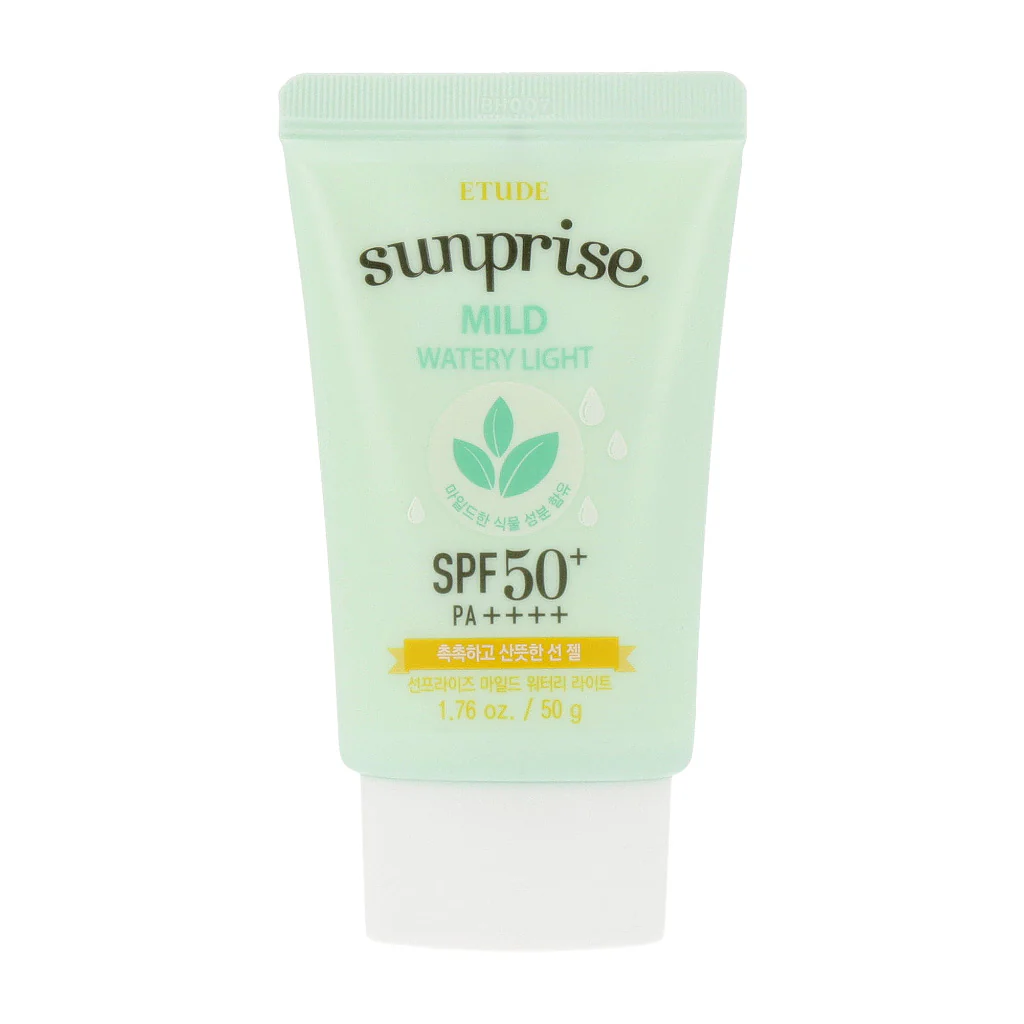
Etude House Sunprise Mild Airy Finish Sun Milk
Sunscreen is crucial for protecting your skin from UV rays that cause premature aging and skin cancer. The Etude House Surprise Mild Airy Finish Sun Milk provides broad-spectrum UVA/UVB protection with a lightweight, non-greasy formula. Daily use helps maintain youthful skin and shields it from environmental damage.
Adapting Korean Skincare Steps for Acne
While the 10-step Korean skincare routine can be beneficial, it may need to be adapted for acne-prone skin. For instance, daily exfoliation may be too harsh for acne-prone skin. It may be better to exfoliate 1-2 times per week.
Similarly, not all skin types may need a separate essence and serum. You might choose one or the other based on your skin’s needs. Sheet masks are a popular part of Korean skincare. For acne-prone skin, look for masks with soothing and anti-inflammatory ingredients.
The use of eye cream is optional. If you choose to use one, select a non-comedogenic formula. Moisturizer is essential, even for oily skin. Choose a lightweight, non-comedogenic formula.
Sun protection is a must. Look for a non-comedogenic sunscreen with broad-spectrum protection. Remember, the goal is to create a routine that works for your skin. Listen to your skin and adjust as needed.
Advanced Acne Care: Treatments and Considerations
Beyond the basic skincare routine, there are advanced treatments and considerations for acne care. These can enhance your routine and address specific concerns. It’s important to remember that these treatments should be used in conjunction with a consistent skincare routine. They are not standalone solutions.
Also, not all advanced treatments are suitable for everyone. It’s important to consider your skin type, acne severity, and overall skin health. Consultation with a dermatologist is recommended before starting any advanced acne treatments. They can provide personalized advice based on your skin condition.
Remember, patience is key. Most acne treatments take several weeks to show results.
Chemical Peels and Their Role in Acne Management
Chemical peels can be a beneficial addition to an acne skincare routine. They involve the application of a chemical solution to the skin to exfoliate and rejuvenate. So, chemical peels can help reduce the appearance of acne scars and improve skin texture. They can also help unclog pores and reduce acne breakouts.
However, chemical peels should be used with caution. They can cause skin irritation and sensitivity, especially in higher concentrations. It’s recommended to start with a lower concentration and gradually increase as your skin tolerates. Always follow the instructions provided with the product.
The Importance of Non-Comedogenic Makeup and Removal
If you wear makeup, it’s important to choose non-comedogenic products. These are less likely to clog pores and cause breakouts. Equally important is the removal of makeup at the end of the day. Leaving makeup on overnight can clog pores and lead to breakouts.
Use a gentle makeup remover or oil cleanser to thoroughly remove all traces of makeup. Follow with a water-based cleanser to ensure your skin is completely clean. Remember, even non-comedogenic makeup can cause breakouts if not properly removed. Make makeup removal a non-negotiable part of your nighttime routine.
Professional and Prescription Options
For severe or persistent acne, professional and prescription options may be necessary. These include oral medications, topical treatments, and in-office procedures. Oral medications, such as antibiotics or isotretinoin, can be effective for severe acne. However, they can have side effects and should be used under the supervision of a dermatologist.
Topical treatments, such as prescription-strength retinoids, can be effective for moderate to severe acne. They can cause skin irritation and sensitivity, so they should be used as directed.
In-office procedures, such as laser therapy or extractions, can help manage severe acne and reduce scarring. These should be performed by a qualified professional.
Remember, professional and prescription options should be considered as part of a comprehensive acne care plan. They are not quick fixes, but they can significantly improve acne when used correctly.
Lifestyle Adjustments for Clear Complexion
Achieving a clear complexion involves more than just a good skincare routine. Lifestyle factors play a significant role in skin health. Diet, exercise, and stress management can all impact your skin. Making positive changes in these areas can support your skincare efforts.
Remember, everyone’s body is different. What works for one person may not work for another. It’s important to listen to your body and make adjustments as needed. Small changes can often make a big difference.
In the following sections, we’ll explore how diet, exercise, and stress management can contribute to a clear complexion.
Diet and Acne: What to Eat and What to Avoid
Diet can influence acne in several ways. Certain foods may exacerbate acne, while others can support skin health. A balanced diet rich in fruits, vegetables, and lean proteins can support skin health. These foods provide essential nutrients for skin repair and maintenance.
On the other hand, dairy and high-glycemic foods may be linked to acne in some individuals. These foods can cause spikes in blood sugar and insulin levels, which can increase sebum production and inflammation.
It’s important to note that the link between diet and acne is complex and individual. Not everyone will experience the same effects from certain foods.
Keeping a food diary can help identify any potential food triggers for your acne. If you notice a pattern, consider making dietary adjustments or consulting with a healthcare provider.
Exercise, Stress Management, and Skin Health
Exercise and stress management are also important for skin health. Both can influence hormone levels, which can impact acne. Regular exercise can improve circulation, reduce stress, and support overall health. Just be sure to cleanse your skin before and after workouts to prevent sweat and oil from clogging pores.
Stress management is equally important. Chronic stress can trigger or worsen acne by increasing inflammation and sebum production. Practices like yoga, meditation, and deep breathing can help manage stress levels. Getting adequate sleep is also crucial for skin regeneration and healing.
Remember, a holistic approach to acne care can yield the best results. Incorporating healthy lifestyle habits can support your skincare routine and contribute to a clear complexion.
Common Myths and Mistakes in Acne Care
When it comes to acne care, misinformation abounds. This can lead to ineffective or even harmful practices. One common myth is that acne is caused by dirty skin. This leads some people to over-cleanse, which can strip the skin of its natural oils and disrupt the skin barrier.
In reality, acne is caused by a combination of factors, including excess sebum production, inflammation, and the presence of acne-causing bacteria. Over-cleansing can actually exacerbate these issues.
Another myth is that you should let acne “run its course”. This can lead to unnecessary suffering and potential scarring. Effective acne treatments are available, and early intervention can prevent acne from worsening. It’s important to seek treatment as soon as acne becomes a concern.
Finally, many people believe that all acne is the same and can be treated with the same products. This can lead to ineffective treatment and frustration.
In reality, acne comes in various forms, including blackheads, whiteheads, and cysts. Each type may require a different treatment approach. Understanding your acne can guide your treatment choices and lead to better results.
Remember, knowledge is power. By debunking myths and avoiding common mistakes, you can take control of your acne care and work towards a clear complexion.
Building a Routine: Morning vs. Night Differences
When it comes to an acne skincare routine, timing matters. The needs of your skin vary throughout the day. In the morning, your skin is fresh from a night of repair and regeneration. The focus should be on protection.
At night, your skin is ready to rest and rejuvenate. The focus should be on treatment and repair. Understanding these differences can help you build a routine that works with your skin’s natural rhythms. This can enhance the effectiveness of your skincare products and promote healthier skin.
Let’s delve into the specifics of a morning and nighttime acne skincare routine.
Morning Acne Skincare Routine
A morning acne skincare routine should be all about protection.
- Start with a gentle cleanse to remove any sweat or oil from the night.
- Follow with a toner to balance your skin’s pH and prepare it for the next steps.
- Apply a lightweight, non-comedogenic moisturizer to hydrate your skin without clogging pores.
- Finish with a broad-spectrum sunscreen to protect your skin from harmful UV rays.
Remember, UV exposure can worsen acne and lead to post-acne marks. Daily sunscreen is a must, even on cloudy days.
Morning Acne Skincare Routine
A morning acne skincare routine should be all about protection.
- Start with a gentle cleanse to remove any sweat or oil from the night.
- Follow with a toner to balance your skin’s pH and prepare it for the next steps.
- Apply a lightweight, non-comedogenic moisturizer to hydrate your skin without clogging pores.
- Finish with a broad-spectrum sunscreen to protect your skin from harmful UV rays.
Remember, UV exposure can worsen acne and lead to post-acne marks. Daily sunscreen is a must, even on cloudy days.
Nighttime Acne Skincare Routine
A nighttime acne skincare routine should focus on treatment and repair.
- Begin with a double cleanse to thoroughly remove makeup, sunscreen, and impurities from the day.
- Use a toner to restore your skin’s pH balance and remove any residual cleanser.
- Apply targeted treatments, such as serums or spot treatments, to address specific acne concerns.
- Finish with a moisturizer to hydrate and support your skin’s overnight repair process.
At night, your skin is more receptive to active ingredients. This makes it the perfect time to use potent acne treatments. Just remember to introduce new products gradually to avoid irritation.
Monitoring Progress and When to See a Dermatologist
Tracking your skin’s progress is an essential part of your acne skincare routine. It can help you understand how your skin responds to different products and treatments. This can guide you in making adjustments to your routine as needed.
Consider keeping a skincare diary. Note down the products you use, any changes in your skin, and potential triggers like diet or stress. Over time, you may start to see patterns that can help you manage your acne more effectively.
However, it’s important to remember that skincare is not a quick fix. Most acne treatments take at least 4-6 weeks to show results. Patience and consistency are key.
If you don’t see improvement after a few weeks, or if your acne is severe, it might be time to see a dermatologist.
A dermatologist can give you a detailed look at your skin. They can also suggest treatments that might work better for you. This could include prescription medications, professional treatments, or advice on lifestyle changes.
Remember, everyone’s skin is unique. What works for one person may not work for another. It’s about finding what works best for your skin.
Conclusion:
Acne can be hard to manage. However, with the right skincare routine, you can have clearer, healthier skin. Remember, skincare is a journey, not a destination. It’s about understanding your skin, listening to its needs, and responding with care and patience.
Don’t be discouraged if you don’t see immediate results. It takes time for your skin to adjust to new products and for treatments to take effect. In the end, the journey to clear skin is also a journey to self-care and self-love. Embrace it, and remember that you are beautiful, acne or not.
Recommended Products and Resources
In your journey to clear skin, it’s important to have the right tools and resources at your disposal. Here are some recommended products for each step of your acne skincare routine:
- Cleansers: B Prox 10 Anti Blemish Wash: Medicated Acne Cleanser
- Exfoliators: Paula’s Choice Skin Perfecting 2% BHA Liquid Exfoliant, The Ordinary Glycolic Acid 7% Toning Solution
- Toners: Thayers Witch Hazel Alcohol-Free Toner, COSRX AHA/BHA Clarifying Treatment Toner
- Treatments: Blemish Clearing Calm + Correct Spot Treatment
- Moisturizers: Oily & Acne-Prone Deluxe Set
- Sunscreens: EltaMD UV Clear Facial Sunscreen, Neutrogena Clear Face Liquid Lotion Sunscreen
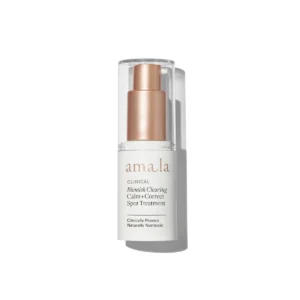
Blemish Clearing Calm + Correct Spot Treatment

Oily & Acne-Prone Deluxe Set
Resources:
In addition to these products, here are some resources that can help you further understand acne and skincare:
- American Academy of Dermatology: Offers a wealth of information on skin conditions, including acne.
- Paula’s Choice Ingredient Dictionary: A comprehensive guide to the ingredients found in skincare products.
- r/SkincareAddiction: A Reddit community dedicated to skincare. A great place to share experiences and get advice.
Remember, everyone’s skin is unique. What works for one person may not work for another. Always patch-test new products and introduce them into your routine gradually.
Make sure to see a dermatologist if you have severe acne. Also, consult them if your skin does not get better after using over-the-counter treatments. They can provide personalized advice and prescribe stronger treatments if necessary.
With the right knowledge, products, and patience, you’re well on your way to achieving a clear complexion.
Do you need more skin care tips for acne? Read this: How to Choose the Best Moisturizer for Acne?
Microbiome/ Probiotic Skincare:
Affiliate Disclosure:
The links contained in this product review may result in a small commission. This goes towards supporting our research and editorial team and please know we only recommend high-quality products.
Note: This article is for informational purposes only and is not intended to diagnose, treat, or cure any disease. Always consult a healthcare professional before taking any supplement or making any changes to your diet or lifestyle.
